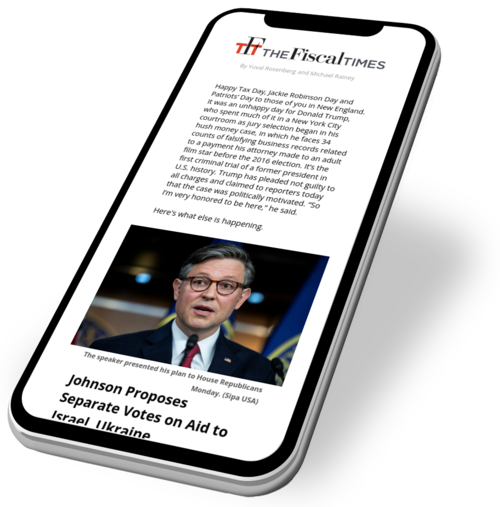Johnson Unveils Plan for Israel, Ukraine Aid

Happy Tax Day, Jackie Robinson Day and Patriots’ Day to those of you in New England. It was an unhappy day for Donald Trump, who spent much of it in a New York City courtroom as jury selection began in his hush money case, in which he faces 34 counts of falsifying business records related to a payment his attorney made to an adult film star before the 2016 election. It’s the first criminal trial of a former president in U.S. history. Trump has pleaded not guilty to all charges and claimed to reporters today that the case was politically motivated. “So I’m very honored to be here,” he said.
Here's what else is happening.
Johnson Proposes Separate Votes on Aid to Israel, Ukraine
Iran’s unprecedented direct attack on Israel this weekend has ramped up the pressure on Speaker Mike Johnson to decide on a path forward for foreign aid funding that has been stalled in the House for months.
House Republicans met this evening to discuss their next steps, and Johnson reportedly again rejected the idea of allowing a vote on the $95 billion aid package passed by the Senate in February with strong bipartisan support. He instead laid out a plan calling for Republicans to vote on separate bills for aid to Israel, Ukraine and Taiwan along with a fourth bill that includes a ban on TikTok and some other Republican proposals, including a lend-lease deal for military aid and a plan to sell seized Russian assets to fund Ukraine’s war effort.
Johnson told Fox News on Sunday that he understands the urgency of delivering aid to Israel and would try again to do so this week. But the White House has already come out against a stand-alone bill for Israel, which would leave the outlook for further funding to Ukraine uncertain at best. Former President Donald Trump has repeatedly raised the idea of structuring aid to Kyiv as a loan, leaving open the possibility that Republicans would help push through such a plan. But the conservative House Freedom Caucus is already warning against using Iran’s attack to pass more funding for Ukraine. “Under no circumstances will the House Freedom Caucus abide using the emergency situation in Israel as a bogus justification to ram through Ukraine aid with no offset and no security for our own wide-open borders,” the group said.
Johnson’s plan for the aid package comes after he spoke Sunday with President Joe Biden and the three other top congressional leaders. The White House said Biden urged Johnson to take up the Senate bill, which Senate Majority Leader Chuck Schumer, Senate Minority Leader Mitch McConnell and House Minority Leader Hakeem Jeffries also support. Schumer told reporters that Israel had used more than $1 billion worth of materiel to defend itself against Iran’s drones and missiles and would need to replenish its defenses. The Senate-passed plan includes $14 billion for Israel. “The best way to help Israel rebuild its anti-missile and anti-drone capacity is by passing that supplemental immediately,” Schumer said.
In the wake of the attack, House Republican leaders quickly packed this week’s agenda with a slew of bills targeting Iran and supporting Israel, but the Senate package was not on the list. Johnson has refused to allow the House to consider that bill, which much of his conference opposes because it includes $60 billion in additional funding for Ukraine. Bringing up the Senate plan would invite a Republican move to oust him and could well cost Johnson his job.
Nearly 1 in 4 of Those Removed From Medicaid Now Uninsured
Millions of Americans have been removed from state-level Medicaid programs over the last year, following the official end of the Covid-19 pandemic and the return to pre-pandemic rules governing access to the system. According to the “unwinding tracker” maintained by KFF, a nonpartisan health policy research group, about 20.1 million people have been removed from Medicaid coverage as of April 11, 2024, with the majority of removals occurring for procedural reasons such as failure to submit required paperwork.
Thanks to the first national survey of those who lost their coverage, we now know what happened to them after disenrollment. The KFF survey found that the largest group (47%) reenrolled in Medicaid in the months following their disenrollment — which, as Phil Galewitz of KFF Health News notes, suggests they should not have been disenrolled in the first place.
The second largest group (28%) found health insurance through other sources. A bit more than half of that group became insured through an employer, while about a third gained coverage through Medicare. A slightly smaller number signed up for coverage through the federal marketplaces created by the Affordable Care Act.
The remaining group (23%) reported that they are now uninsured. Asked why they did not acquire alternative coverage, a majority of respondents within that group (54%) cited cost as the primary reason. About a third said they were trying to get back onto Medicaid, while roughly a quarter said they were unaware of other options for insurance.
John Oliver Takes Aim at Medicaid Problems
Comedian John Oliver highlighted the chaos of Medicaid disenrollment in the latest installment of his HBO show, "Last Week Tonight," which aired Sunday. Oliver, who hails from the U.K., a country with a universal healthcare system that obviates the need for annual rituals of disenrollment, expressed amazement at the idea that people could lose something as vital as health insurance simply because they failed to fill in the right form.
“Just for once, could the government blindside people with something beneficial, or even just fun?” Oliver asked. “Like if one day Congress announced they’d be adding Shrek to Mt. Rushmore.”
In one of his signature deep dives on the issue, Oliver said the disenrollment process points to long-running problems with the administration of Medicaid, which was enacted in 1965 as a way to provide health care for low-income households. But inconsistent rules from state to state, poor communication interfaces and bewildering forests of red tape all suggest a resistance to making the system run at maximum efficiency.
Echoing long-standing criticism, Oliver said “there are times when it feels like the obstacles to getting Medicaid have been put there deliberately, so that states can keep those that they see as undeserving off the rolls.”
Oliver noted that some states are obsessed with the idea of fraud, though with a focus on individuals receiving medical care they aren’t technically entitled to receive rather than the large private firms that have their hands in the till — usually for much greater sums than any individual could make off with.
"So much of the talk around Medicaid seems to center on the fear that someone, somewhere, might be gaming the system," Oliver said. "Again and again, the priority seems to be making sure no individual gets a penny more healthcare than they deserve, even as states are weirdly blithe about much bigger amounts of money flowing out the door to large organizations.”
“The reality of Medicaid,” he concluded, “is that too often it’s hard to get, easy to lose and not a priority for the government or the companies we hire to deliver care.”
Fiscal News Roundup
- Johnson Proposes Separate House Votes on Ukraine and Israel This Week – Politico
- Speaker Johnson Unveils Plan for Ukraine, Israel at Closed-Door GOP Meeting – The Hill
- White House Opposes Stand-Alone Israel Aid Bill Following Iranian Attack – The Hill
- Freedom Caucus: Iran Attack on Israel Sets Up ‘Bogus’ Reason to Pass Ukraine Aid – The Hill
- House GOP Lines Up Bills Targeting Iran as Congress Remains Divided Over How to Send Aid to Israel – CNN
- US Defense of Israel’s Skies Sparks Ukrainian Envy and Ire – Wall Street Journal
- IRS Expects ‘a Million Returns’ Every Hour on Tax Day, Commissioner Says – CNBC
- The IRS’s New Tax Software: Rave Reviews, but Low Turnout – Washington Post
- Warren Slams TurboTax for Upselling Taxpayers During Filing Process – The Hill
- New York Tax Preparer Charged With Causing More Than $100 Million in Losses From Fraudulent Returns – CNBC
- McCarthy on Greene’s Move to Vacate Johnson: ‘I Don’t Think It’ll Ever Happen’ – The Hill
- Fed Hiking Rates to 6.5% Is ‘Real Risk’ for UBS Strategists – Bloomberg
- Telecom Fights Price Caps as U.S. Spends Billions on Internet Access – Washington Post
Views and Analysis
- It’s Make or Break Time for Israel, Ukraine Aid … and Johnson – Leigh Ann Caldwell and Theodoric Meyer, Washinton Post
- Democrats, Support Speaker Johnson – Rep. Tom Suozzi (D-NY), Wall Street Journal
- Senate Republicans’ Breathtaking Cruelty Is Hidden in Your Tax Returns – James Downie, MSNBC
- The $6 Trillion Decision – David Dayen, American Prospect
- Why Better Times (and Big Raises) Haven’t Cured the Inflation Hangover – Talmon Jospeh Smith, New York Times

